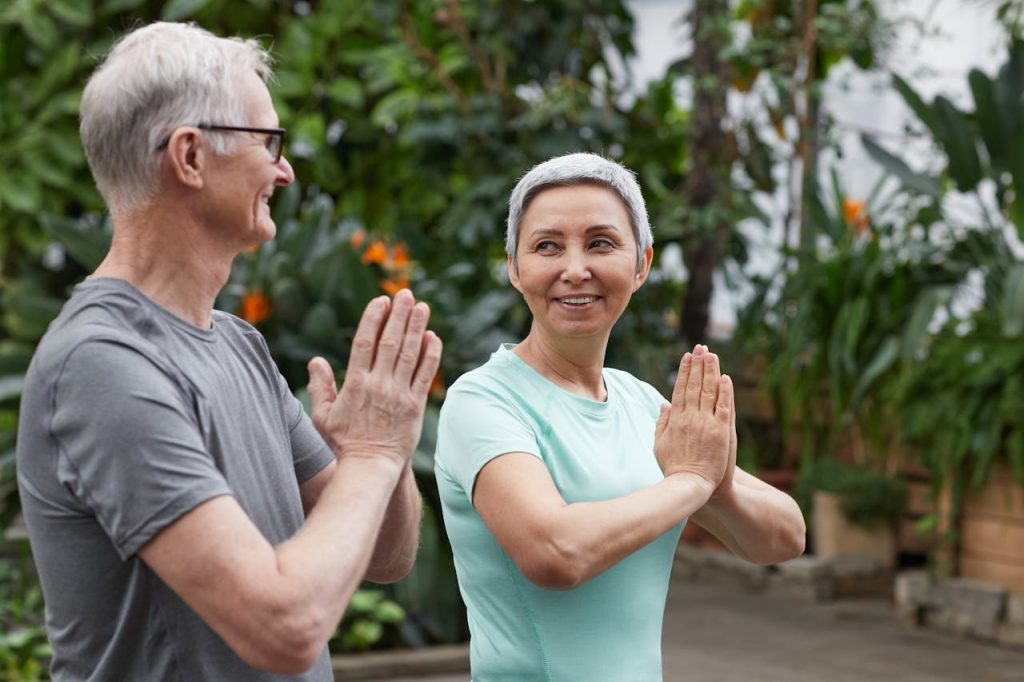Aging doesn’t have to mean a loss of independence. With proactive health and wellness strategies, seniors can maintain autonomy, enhance their quality of life, and navigate aging with confidence. This guide delves deeply into the key areas that foster independent living: physical activity, nutrition, mental health, social connections, preventive healthcare, and a safe living environment, all within a holistic framework. Each section includes actionable strategies tailored to the needs of older adults.

Physical Activity: A Cornerstone Of Independent Living
Physical activity is pivotal in maintaining mobility, reducing the risk of chronic diseases, and improving overall physical and mental well-being. Aging often comes with muscle loss, reduced bone density, and joint stiffness, but regular exercise can slow these processes and enhance independence.
Benefits Of Regular Physical Activity
- Muscle Strength: Preserves muscle mass, improving mobility and reducing the risk of falls.
- Bone Health: Strengthens bones and reduces the risk of osteoporosis.
- Cardiovascular Health: Enhances heart and lung function, lowering the risk of heart disease.
- Balance And Flexibility: Improves coordination, reducing fall risks, a major cause of injuries in older adults.
- Mental Health: Releases endorphins, alleviating stress and improving mood.
Key Recommendations
1. Aerobic Exercise:
- Aim for 150 minutes of moderate aerobic activity weekly.
- Examples include brisk walking, swimming, or low-impact cycling.
2. Strength Training:
- Include strength-building activities twice a week, such as resistance bands or light weightlifting.
- Focus on major muscle groups to maintain functional strength for daily tasks.
3. Balance And Flexibility:
- Practice yoga or tai chi, or perform balance exercises like standing on one leg.
- Stretch daily to maintain joint flexibility and ease of movement.
Practical Tips
- Incorporate physical activity into daily routines, such as gardening, cleaning, or walking the dog.
- Create a safe exercise environment with non-slip mats, proper footwear, and assistive tools.
- Join community fitness classes tailored for seniors, fostering social interaction alongside physical health.
Nutrition: Fueling The Body For Strength And Energy
Proper nutrition is essential for physical vitality, mental clarity, and overall health. A well-balanced diet can help manage or prevent chronic conditions like hypertension, diabetes, and osteoporosis, all of which can impact independence.
Key Nutritional Goals
1. Nutrient-Dense Foods:
- Prioritize fresh fruits, vegetables, whole grains, lean proteins, and healthy fats.
- Limit processed foods, saturated fats, and excess sodium.
2. Hydration:
- Seniors are more susceptible to dehydration. Aim for at least 8 cups of water daily, supplemented by hydrating foods like cucumbers, watermelon, and soups.
3. Bone Health:
- Ensure adequate calcium (1,200 mg/day) and vitamin D through fortified dairy products, leafy greens, or supplements.
4. Cognitive Function:
- Incorporate foods rich in omega-3 fatty acids, such as salmon, walnuts, and flaxseeds, to support brain health.
Practical Tips For Success
- Meal Planning: Prepare meals in advance, emphasizing variety and nutritional balance.
- Convenience: Use meal delivery services or frozen pre-portioned meals that adhere to dietary guidelines.
- Social Interaction: Cook and eat meals with family or friends to combine healthy eating with emotional well-being.
- Professional Advice: Consult with a dietitian or healthcare provider to create a personalized nutrition plan tailored to individual health needs.

Mental Health And Cognitive Wellness
Mental well-being is integral to independent living. Cognitive decline, depression, and anxiety can impair decision-making and self-care abilities, but proactive strategies can preserve mental sharpness and emotional health.
Challenges To Mental Wellness
- Isolation and loneliness.
- Cognitive conditions such as dementia or Alzheimer’s disease.
- Stress related to aging or life transitions.
Strategies To Promote Mental Wellness
1. Engage In Lifelong Learning:
- Take up new hobbies, attend workshops, or learn a language to stimulate the brain.
2. Practice Mindfulness:
- Techniques like meditation, deep breathing, and yoga can reduce stress and promote emotional balance.
3. Stay Mentally Active:
- Engage in puzzles, crosswords, reading, or writing to challenge cognitive functions.
Supportive Interventions
- Seek professional help for persistent mental health concerns.
- Participate in group therapy or senior support groups to share experiences and combat loneliness.
- Maintain consistent sleep schedules to support cognitive and emotional health.
Social Connections: The Heart Of Emotional Health
Strong social bonds are vital for emotional resilience and overall well-being. Seniors who maintain social connections report higher levels of happiness, better cognitive function, and lower risks of chronic illnesses.
Benefits Of Social Engagement
- Reduces feelings of loneliness and depression.
- Enhances mental agility through stimulating conversations.
- Provides a support network for emotional and practical assistance.
Ways To Stay Connected
1. Community Involvement:
- Join clubs, attend church groups, or participate in community events.
2. Volunteer Work:
- Engage in meaningful activities by helping local schools, libraries, or charities.
3. Technology As A Tool:
- Use video calls, social media, and messaging apps to stay in touch with distant loved ones.
4. Family Engagement:
- Encourage regular visits, shared meals, and intergenerational activities like storytelling or baking.
Practical Tips
- Leverage senior centers or local organizations to discover social activities.
- Explore technology classes to build confidence in digital communication tools.
Preventive Healthcare: Staying Ahead Of Potential Issues
Preventive care is a cornerstone of maintaining independence. Regular check-ups and screenings allow early detection and management of potential health concerns, reducing the likelihood of complications.
Essential Preventive Measures
1. Routine Check-Ups:
- Schedule annual physical exams, dental visits, and vision tests.
2. Screenings:
- Stay current on tests for blood pressure, cholesterol, and diabetes.
3. Vaccinations:
- Keep up-to-date with flu, pneumonia, shingles, and COVID-19 vaccines.
4. Chronic Condition Management:
- Adhere to prescribed treatments and monitor conditions like hypertension or arthritis using home devices.
Tools For Preventive Health
- Use wearable devices to track activity levels, heart rate, and sleep patterns.
- Keep a health diary to document symptoms, medication schedules, and doctor’s appointments.
Creating A Safe And Accessible Living Environment
A well-designed living space enhances safety and allows seniors to navigate their homes comfortably, reducing the risk of accidents.
Home Safety Modifications
1. Fall Prevention:
- Install grab bars in bathrooms, non-slip mats in kitchens, and handrails on stairs.
- Use adequate lighting and remove tripping hazards like loose rugs.
2. Accessibility:
- Rearrange frequently used items to be within easy reach.
- Consider single-level living spaces if mobility becomes challenging.
3. Emergency Preparedness:
- Install medical alert systems or smart home devices for immediate assistance.
Long-Term Planning
- Conduct regular home safety assessments with the help of occupational therapists.
- Explore community programs offering financial support for home modifications.
Holistic Approaches To Aging Well
Holistic health integrates physical, emotional, and social wellness, creating a multidimensional approach to aging. This philosophy emphasizes interconnectedness, promoting a balanced lifestyle.
Key Holistic Practices
1. Mind-Body Integration:
- Combine physical activity with mindfulness, such as practicing yoga in a natural setting.
2. Emotional Resilience:
- Cultivate gratitude through journaling or affirmations.
3. Community Support:
- Engage in wellness coaching programs or holistic therapy sessions.
Conclusion:
Aging well requires a proactive, holistic approach that addresses every aspect of life. Seniors who prioritize physical activity, balanced nutrition, mental wellness, and social connections can extend their years of independent living with vitality and purpose. Preventive healthcare and a safe home environment provide additional layers of support.
Families, caregivers, and communities play crucial roles in this journey, offering encouragement and resources. By embracing these strategies, seniors not only safeguard their independence but also cultivate a life filled with joy, engagement, and resilience. Aging becomes not a limitation but a celebration of life’s possibilities.

Start Your Journey To Senior Health And Wellness With Fitness Ellipsis!
Are you ready to embrace a healthier, more vibrant life as you age? At Fitness Ellipsis, we believe senior health and wellness is about more than fitness—it’s about achieving vitality, mobility, and confidence at every stage of life. Our expert team specializes in crafting personalized fitness plans tailored to the unique needs and goals of seniors.
Whether you’re new to exercise or looking to enhance your existing routine, our comprehensive approach ensures you receive the support, guidance, and motivation to thrive. From tailored fitness programs focused on improving strength, balance, and flexibility to nutritional advice that supports overall well-being, Fitness Ellipsis covers all aspects of senior health to help you maintain a fulfilling and active lifestyle. Don’t wait to invest in your health. Join the Fitness Ellipsis community today and take the first step toward a healthier, more active you. Contact us at Fitness Ellipsis to learn more about our specialized programs for seniors. Your journey to improved health and wellness starts now!




